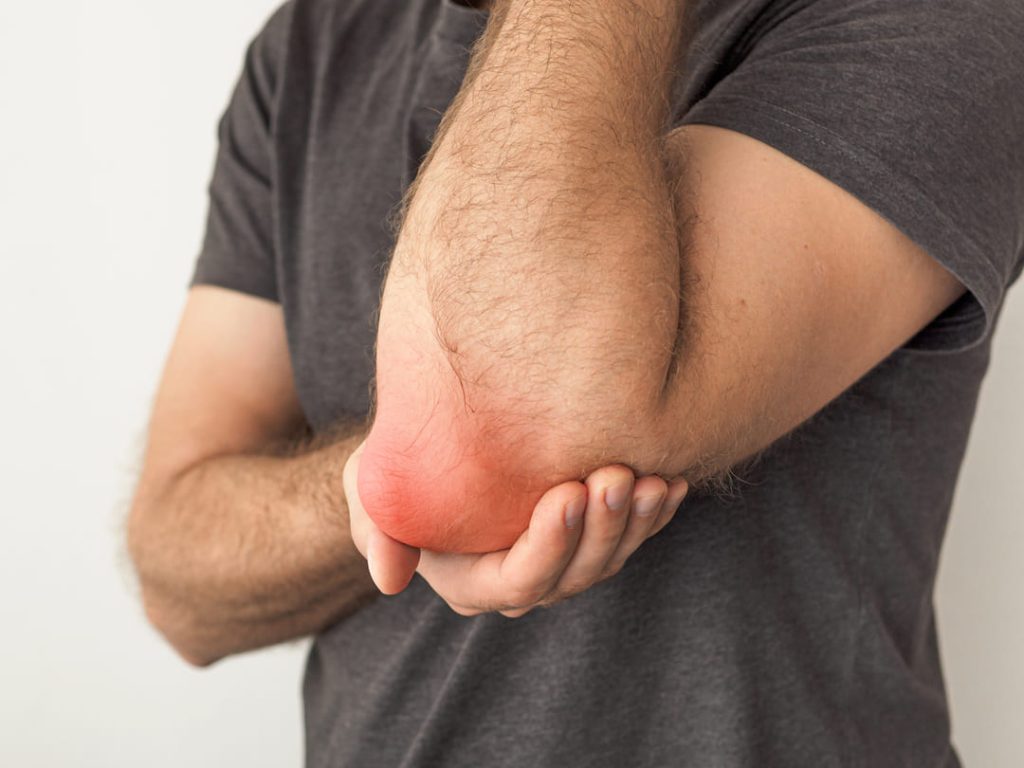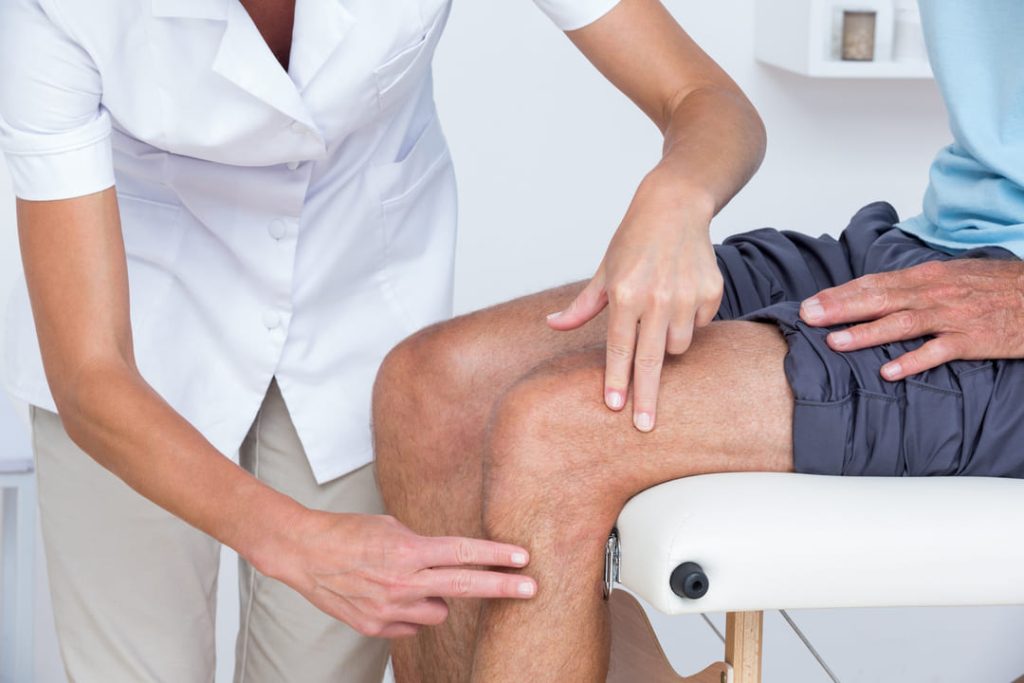Looking for Expert-Level VA Claim Answers?📱Call Us Now! 737-295-2226
Bursitis is a common issue among veterans, and it can really make daily life tough.
If you’re dealing with bursitis and wondering if you could qualify for a VA disability rating, you’ve come to the right place!
In this guide, we’ll examine how the VA evaluates and assigns bursitis VA ratings for different body areas, such as the hip, shoulder, elbow, and knees.
Table of Contents
Summary of Key Points
-
The highest bursitis VA rating is 90%, and the lowest is 10%.
-
Bursitis is rated under many diagnostic codes. Most fall in the arthritis and limited range of motion categories.
-
To win a bursitis VA rating, you need to prove your service caused your bursitis or made it worse (AKA, service connection).
-
If your Bursitis VA claim was denied, you have one year from the date of denial to file a Notice of Disagreement, which tells the VA you plan to appeal.

What is Bursitis?
Bursitis is when the small fluid-filled pouches that help your joints move smoothly and comfortably get swollen and irritated.
These pouches, called bursae, can get inflamed, cause pain and puffiness, and make it harder to move around.
Treatment for bursitis can include:
- Medication. If inflammation is causing your bursitis, you could be prescribed antibiotics to help treat it.
- Physical therapy. Strengthening the muscles around your joints can help ease your bursitis symptoms.
- Injections. A corticosteroid drug injected into the bursa can relieve pain and inflammation in your shoulder or hip. This treatment generally works quickly, and sometimes, one injection is all you need.
- Assistive device. A cane or other device can help relieve pressure on the affected joint.
- Surgery. Sometimes, an inflamed bursa needs to be surgically drained. This is rare but can be necessary.
Deserve a Higher VA Rating?
Book a no-obligation VA Claim Discovery Call with an experienced team member. We’ll review your situation, spot what the VA may have missed, and help you map out a strategy to unlock the VA disability rating and tax-free compensation you’ve earned for your service. Click the red button below to book your call.
Bursitis VA Ratings
VA disability for bursitis is rated between 10%-90%. Your VA rating will depend on which part of your body is affected by bursitis and which diagnostic code (DC) the VA chooses to evaluate you under.
Qualifying for a VA disability rating qualifies you for VA disability benefits and additional tax-free monthly compensation. For VA Disability Compensation Rates See: VA Disability Pay Charts
Every disability rated by the VA is evaluated using tables associated with a diagnostic code. Each table has symptoms that correspond to a rating percentage.
Bursitis is found in the VA Schedule for Rating Disabilities (VASRD) under Diagnostic Code 5019. Below that code is a note saying that bursitis will be rated using the diagnostic code for degenerative arthritis (DC 5003).
If that’s not confusing enough, depending on your specific symptoms, degenerative arthritis can be rated under Limitation of Motion for the specific body part, including a host of other diagnostic codes.
If your bursitis is severe, the VA will usually rate it based on how much the affected joint or joints are limited in their range of motion. I go into more detail on that below.
Hip Bursitis VA Ratings
VA disability ratings for hip bursitis range from 10% to 90%.
VA claims for bursitis of the hip are evaluated under diagnostic codes 5250-5255 and are based on range of motion and pain. A 90% rating under DC 5250 makes you eligible for Special Monthly Compensation (SMC), which can really boost your monthly VA check.
Which code the VA uses to evaluate your claim depends on how much your hip motion is limited and on whether it’s your major or minor joint that’s affected.
For more information on hip bursitis VA rating, check out this informative blog: VA Disability Rating for Hip Pain Explained.
Shoulder Bursitis VA Ratings
A shoulder bursitis VA rating can be evaluated using Diagnostic Codes 5200-5203.
The ratings can range from 10% to 80% depending on how much the shoulder’s range of motion is limited and how much pain is involved.
For example, complete shoulder immobility falls under code 5200, and ratings vary based on whether your major or minor joints are affected.

Elbow Bursitis VA Ratings
The VA evaluates elbow bursitis using Diagnostic Codes 5205-5212.
If your elbow is completely stiff or can’t move at all (known as ankylosis), that falls under code 5205 and can get you up to a 60% disability rating.
Other ratings consider flexion, extension, or ulna/radius impairment, ranging from 10% to 60% disability, based on major or minor joint involvement.
The key is how much your elbow bursitis limits your range of motion and causes you pain.

Knee Bursitis VA Ratings
Knee bursitis VA ratings range from 0% to 60%.
Your knee bursitis could be rated by the VA under a few different codes, depending on the symptoms you’re experiencing. Typically, it’ll be rated under Diagnostic Codes 5256-5262.
For example, code 5256 is for when your knee joint doesn’t move properly, while other codes look at whether your knee gets “locked” in place, how much it can bend and straighten, if it feels unstable, and more.
Whether bursitis affects a major or minor joint also influences the VA’s rating decision.

Service Connecting Your Bursitis
To get a bursitis VA rating, you’ll need to be able to service-connect the condition. This is when you’re able to prove your military service caused your disability or made it worse.
There are three crucial elements involved in proving service connection, known as the Caluza Triangle:
- A current medical diagnosis. The VA can’t rate a condition that hasn’t been formally diagnosed by a qualified medical professional.
- Evidence of an in-service event, injury, or illness. You need to have evidence that something happened during and because of your service that caused your disability or made it worse.
- A medical link between #1 and #2. Does the medical evidence suggest that your in-service event, injury, or illness is most likely the cause of your bursitis? If you get a Nexus Letter, the link will be expressed as one of these statements of probability:
- “Is due to” = 100% certain
- “More likely than not” = greater than 50% certain
- “At least as likely as not” = equal to 50% certain
- “Not likely due to” = less than 50% certain
- “Is not due to” = 0% chance
There are several things from your time in the military that could cause bursitis. Think about your time in the military. Did you ever:
- Repetitively lift heavy objects
- Crawl on the ground
- Kneel or apply pressure to your knees
- Overuse or strain any joint
- Sit or stand for long periods of time
Any of these common military activities could be your in-service event or injury.
C&P Exams Related to Bursitis
After you file a VA claim for bursitis, the VA might request a Compensation and Pension Exam (C&P exam).
This request can come through a call, a letter, or an email from the VA.
The VA uses the results of your C&P exam to determine if your disability is related to your time in service and to assess what rating percentage your condition warrants.
PRO TIP: It’s important to attend your C&P exam, as missing it could lead to a delay in your claim. It could even lead to claim denial. If you miss your C&P Exam and don’t have “good cause” for doing so, the VA may decide your claim based only on the evidence submitted with your claim or the evidence in your military medical records.
The C&P exam is generally conducted by a VA or VA-contracted physician.
Before the exam, the examiner will review your C-file, containing all previously submitted documentation, medical records, and military service history.
Was Your VA Disability Claim for Bursitis Denied?
If your VA bursitis claim was denied, you have several appeal options.
One option is to file a Notice of Disagreement (NOD), which informs the VA that you disagree with their decision and plan to appeal.
Remember, you have one year from the date of the denial to submit a NOD! You can use VA Form 10182 to file a Notice of Disagreement.
Another option is to request a Senior Rating Specialist to review your case through a Higher-Level Review (HLR) request.
This review is designed to overturn a decision without submitting new evidence, but it can also identify any errors made by the VA that require correction.
However, if you wish to submit additional evidence, you can file a Supplemental Claim within one year of the denial.
This option allows you to present new evidence while maintaining the earliest possible effective date based on your original claim.
It’s important to submit all relevant evidence at the same time as filing the Supplemental Claim to strengthen your case.
NEED MORE ASSISTANCE?
Most veterans are underrated for their disabilities and, therefore, not getting their due compensation.
At VA Claims Insider, we help you understand and take control of the claims process so you can get the rating and compensation you’re owed by law.
Our process takes the guesswork out of filing a VA disability claim and supports you every step of the way in building a fully-developed claim (FDC)!
If you’ve filed your VA disability claim and have been denied or have received a low rating—or you’re unsure how to get started—reach out to us! Take advantage of a VA Claim Discovery Call.
Learn what you’ve been missing—so you can FINALLY get the disability rating and compensation YOU DESERVE!
Author

Clay Huston
Clay Huston is a former U.S. Army Reserves Blackhawk Pilot and officer. Clay enlisted in the Army in 2013 and was commissioned as a 2LT in 2017 after earning a business degree from the University of Illinois Champaign-Urbana.
Since separating from the military, Clay has pursued a career as a writer. He also runs the nonprofit notfatherless.org, which fundraises for Children’s Homes in Mexico.



